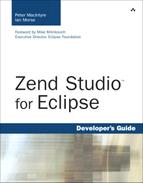As an extensible tool integration platform, Eclipse has spawned the creation of a large and vibrant open source and commercial software ecosystem. Zend Studio for Eclipse is a significant addition to that ecosystem.
From the perspective of our community, the PDT (PHP Development Tools) project is an important new addition to Eclipse. Although we are best known for our Java IDE, the Eclipse community has long since evolved into something much more interesting. I believe that it is fair to say that today Eclipse has become the leading open source tooling integration platform. Our goals are not to simply create an integrated development environment (IDE), but to create a platform for many IDEs. Even more challenging, our community is creating a tooling platform that supports the creation of all types of software tools, extending well beyond the scope of traditional developer tools. Today at Eclipse, you can find tools that span the complete software development lifecycle from modeling and design to data analysis to development to testing and monitoring.
But amongst many developers, the perception remains that Eclipse is a “Java thing”. While it is true that most of the code built at Eclipse is written in Java, our goals have always been to provide development tools that span as many programming languages and platforms as possible. For example, our C/C++ Development Tools (CDT) project has achieved a lot of success in the Linux and embedded development worlds. The PDT project upon which Zend Studio for Eclipse is based is a further (and critical) evolution of this vision.
As one of the largest and fastest growing web development languages, PHP has quickly grown to a mainstream enterprise development language and platform. In addition to being the web development language of choice for many sites (we use it ourselves at www.eclipse.org!), it is also the technology that underlies many of the Web’s most important wiki and content management systems. As an everyday example, consider the very popular Wikipedia site which is built on MediaWiki which is, in turn, based on PHP. Another very popular PHP-based web property is Facebook. There are too many examples to possibly list here, but the point is that PHP as a language and as a platform is firmly woven into the fabric of our everyday use of the Web. And it has achieved that in just slightly over 10 years of existence (starting from PHP 3). At the time of writing, PHP is currently the fourth most popular programming language on the planet (source: http://www.tiobe.com/tpci.htm). In fact, the now-classic combination of PHP with Linux, Apache and MySQL (commonly referred to as the LAMP stack) is widely credited with the rapid growth of dynamic web properties over the past decade. It is a proven stack which meets the business and technical needs of many of the most important websites that we all use on a day-to-day basis.
The Eclipse community itself may be used as a proof point of PHP’s adoption and success. While the Eclipse platform and projects are implemented in Java, if you take a look at the many web properties run by the Eclipse Foundation, they are all implemented in PHP.
PDT provides you, the PHP developer, with the tools you need to build, debug and deploy PHP applications.
But just as importantly, because PDT is based on the Eclipse platform, it provides you with not only great PHP development tools but with a tools platform that you can use to integrate with other Eclipse-based products and open source plug-ins. PDT is designed to be an open extensible system, and a large measure of its future success will be growth in the number of its own ecosystem of Eclipse plug-ins, both open source and commercial. But in addition, there are a great many existing Eclipse plug-ins that you can draw upon to extend your tooling environment. To tap into this world of Eclipse extensions, take a look at our Eclipse Plug-In Central website (also implemented on PHP) which can be found at:
Hopefully both the Zend Studio for Eclipse Developers Guide and the PDT toolset will make you a more productive PHP developer. But please remember that Eclipse is all about active community involvement, and we hope to welcome you soon as an active contributor to PDT and other projects at Eclipse. As you work with PDT and the capabilities described in this book, I’d encourage you to communicate your successes back to the community, and perhaps consider contributing any interesting extensions you may develop. The PDT website may be found here:
It includes pointers to the PDT newsgroup—where you can communicate and share your results with other PDT users and adopters—and pointers to the Eclipse installation of Bugzilla, where you can contribute your bugs, comments and patches.
Mike MilinkovichExecutive Director,Eclipse Foundation
